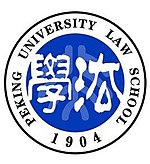This article contains promotional content. (November 2022) |
 School Logo | |
| Type | Law school |
|---|---|
| Established | 1904 |
Parent institution | Peking University |
Academic staff | 70 - 80 |
| Undergraduates | 700 |
| Postgraduates | 1100 |
| 200 | |
| Location | , China 40°48′25″N 73°57′37″W / 40.80694°N 73.96028°W |
| Website | law.pku.edu.cn |
 | |
Peking University Law School (Chinese: 北京大学法学院) is a law school of Peking University, a public research university in Beijing, China.
Founded in 1904 as the law department of Peking University, it is the oldest law school in China.[1] Since 2015, it has been ranked first in Mainland China and one of top three law schools in Asia by QS World University Rankings.[2] It has been generally regarded as one of the most competitive and selective law schools in China.[3] The school's Bachelor of Laws students have the highest average scores in China's college entrance examination among all law schools in China, with the average acceptance rate of Master of Laws and Juris Master is less than 10% in 2017.[4][5]
Peking University Law School confers four types of law degrees: Bachelor of Laws, Master of Laws, Juris Master, and Doctor of Laws. As of 2017, PKU LAW employs more than 70 professors and has established 36 research centers. Four of the law school's disciplines including Legal Theory Studies, Constitution and Administrative Law Studies, Economic Law Studies, and Criminal Law Studies are ranked the best in China.[6] The school publishes 11 legal journals, including Peking University Law Journal (edited by staff members) and Peking University Law Review (edited by students).[7]
Peking University Law School has produced many luminaries in both law and politics. Its alumni include China's former Premier Li Keqiang and four of the current justices of China's Supreme Court, Jiang Bixin, Nan Ying, Sun Huapu and Pei Xianding.[8] According to a survey conducted in 2017, 246 partners of China's top 8 law firms are PKU LAW alumni, more than the second and the third-ranked law school combined.[9] The school is also the workplace for some of the most prominent legal scholars in China, including Zhang Qianfan, Chen Xinliang, and He Weifang.
- ^ "About_Peking University Law School". en.law.pku.edu.cn. Retrieved 2017-06-22.
- ^ "Law". Top Universities. 2017-03-02. Retrieved 2017-06-22.
- ^ "Top Law Schools in China: The Old G9 and Ten Rising Stars - China Legal Research Guide - China Justice Observer". www.chinajusticeobserver.com. Retrieved 2023-01-31.
- ^ MBAChina. "历年录取分数线-北京大学招生网". www.gotopku.cn. Retrieved 2017-06-23.
- ^ "按院系浏览". admission.pku.edu.cn. Retrieved 2017-06-23.
- ^ "About_Peking University Law School". en.law.pku.edu.cn. Retrieved 2017-06-22.
- ^ "Welcome to Peking University". english.pku.edu.cn. Retrieved 2017-06-22.
- ^ "Justices". english.court.gov.cn. Retrieved 2017-06-22.
- ^ "走向金字塔顶端:红圈所1042名合伙人,都毕业于哪些院校?-智合". www.zhihedongfang.com. Retrieved 2017-06-23.